TU SOM Syllabus Template - TMedWeb - Tulane University
TU SOM Syllabus Template - TMedWeb - Tulane University
TU SOM Syllabus Template - TMedWeb - Tulane University
Create successful ePaper yourself
Turn your PDF publications into a flip-book with our unique Google optimized e-Paper software.
4. Utilize and master all the Study Guides provided on the Web. Provided in these guides arelecture objective, important lecture concepts, key words and phrases which should becompletely understood, and questions that test your basic understanding of the lectureconcepts. Come to class having looked these over. Revisit the guides after class to helpyou put it all together and to test yourself.5. Utilize the lecture hand outs, which include all of the lecture slides with room to makeadditional notes. These are useful in lecture so as to limit the amount of additionalwriting. Much is already in the hand outs, enabling the student to listen and digest thematerial given by the lecturers, especially true if the student has already previewed thematerial before class (as suggested above). After class, take these notes and fill in theblanks with the text, lecture recordings and study guides. With all three resources, andmuch outside study time, you should have exemplary notes that may be vastly superior tothe material supplied by the note taking service. In addition, by sheer repetition, you willhave already assimilated much of the material, thereby reducing the need to cram later.6. Utilize Attend the review sessions. At regular intervals, review sessions are scheduledduring class time. During these sessions, the course director will field general questions.If no questions are presented, the course director will ask questions to the class, askingspecific students for their answers. If you come, be prepared. This is not meant todiscourage attendance, but rather to get everyone involved. If you can explain a conceptto your fellow classmates, then you understand that concept. If you can’t explain it, thereare probably others who do not as well. Together we will all help each other.7. Study actively and test your knowledge objectively. Included in On-line resources aretextbook chapter quizzes. Look at them regularly, not just at the end of the block (tocram for the test). Don’t take the information for granted. We provide much material foryou. However, it will ultimately be up to you to learn it. Seek out help in the form of selfassessment questions, the review sessions and from the course director and lecturers.Many students are lulled into a false sense of security because everything seems there forthem. It will still take much effort on your part, including a regular assessment regimen.8. Learn in teams. At the beginning of every year, you will be assigned to a team of 5-7students (primarily for team-based learning). Use your team to self teach each other.Plan a weekly meeting. Each student can be assigned a lecture topic. They write 3-4questions on that topic, and present them to the team at the weekly session. The teamdiscusses the topic through the questions and self teaches all of the members.Understanding why the incorrect answers are wrong is as equally important asunderstanding why the correct answer is right. If everyone is committed to the process,everyone will come prepared on their individual topic. The group self learning method is apowerful way to succeed.9. Utilize the USMLE review books (e.g. BRS Biochemistry and Molecular Biology). Bykeeping up with this resource throughout both Biochemistry courses, the student will alsobe better prepared for the national licensure exam, the National Board of MedicalExaminers (NBME) Subject Exam in Biochemistry, which serves as the final for theMetabolism course. Remember that topics from both courses are tested on theNBME Biochemistry Subject Exam.10. It can not be stressed enough the fact that the course director and other instructors arehere to help you. If you feel that you do not get some topic, come see us. Do not waituntil you are inundated with too much to learn, or after you perform poorly on an exam.Asking a daily question right after every lecture is an excellent way to clear up confusingtopics. We are here to educate and guide you, but ultimately it is up to you to learn thematerial. Please take advantage of the experienced instructors that <strong>Tulane</strong> <strong>University</strong> hasprovided to you. That is what we are here for.___________________________________________________________________________________<strong>Tulane</strong> <strong>University</strong> School of Medicine - Cellular Biochemistry <strong>Syllabus</strong> and Course Information4
COURSE POLICIES:Attendance:With the exception of TBL sessions (which contributes to your grade), class attendance is notrequired, although it is felt that many would benefit by attending lectures and interactingregularly with the course director and instructors. It is the student’s responsibility to learn thematerial, regardless of attendance.Biochemistry Mail Box (BMB) and the “Opt-In” Policy:Your BMB number is a unique identifier. It is used for your mailbox (across from Dr Franklin’soffice), and on all examinations. Be sure to obtain your BMB number using the course web site(under Student Information), or directly from the course coordinator, Mr. Estrada. All printedcommunications (e.g. handouts) will be deposited in your mailbox. To conserve on the use ofprinted resources, the Biochemistry Department uses an “Opt In” policy. To opt into receivingprinted handouts from Mr. Estrada, you MUST notify him that you wish to receive printedresources. If you fail to notify Mr. Estrada of your desire to Opt In, you will not receive anyprinted material.Exam Policies:There will be a total of three "block" exams. Each exam is a weighted percentage of the finalgrade, based on the number of lecture hours covered in each block. The Exam Schedule isposted on the website (under Student Information). Exam information also appears in the<strong>Syllabus</strong> of lectures (see below).Absence from any exam without prior written excuse results in a score of 0 on that exam. Onlystudents whose absences have been pre-approved by the Associate Dean for Student Affairs willbe allowed to take a make-up exam. Grades will be assigned Pass/Fail according to the <strong>Tulane</strong>School of Medicine's grading system as follows: Pass: 70 or above; Conditional: 65-69; Fail:below 65. The Associate Dean for Student Affairs will be notified of students who condition or failexams and the course.Challenges to Exam Questions:Challenges to exam questions are not accepted. This is a firm and long-standing course policy.Before exams are returned, results are carefully screened by statistical item analysis. Poorquestions are removed or adjusted via internal faculty challenges only. In addition, any questionthat is answered incorrectly by 65% or more of the class will be removed from the exam. Allstudents receive credit if a question is removed from an exam. However, we welcomeconstructive comments on exam questions. Please make these comments via email to the CourseDirector.Practice Exams and Extra Credit:Students are given the opportunity to earn extra credit by writing exam questions that will beused on practice exams prior to each block exam. To be eligible for this extra credit, studentsmust first take the on-line Student Self Assessment Exam by the end of the first week of class.Students who fail to take the Self Assessment Exam forfeit the ability to earn extra credit.- Each student is assigned two lectures in the course (look at file “Student LectureAssignments for Practice Exam Qs” in the Student Information on the course website).- For each assigned lecture, the student creates one exam question in multiple choiceformat (5 possible answers please).- The submitted question must indicate the correct answer, and include a briefexplanation why the correct answer is right and distracters are wrong. Failure toprovide the explanations voids the ability to receive extra credit.- Questions must be emailed to the course director no later than two days after theassigned lecture.___________________________________________________________________________________<strong>Tulane</strong> <strong>University</strong> School of Medicine - Cellular Biochemistry <strong>Syllabus</strong> and Course Information5
- For each assigned lecture, students receive 1 point added to their final course average forsubmitting a practice exam question in the correct format within the two day timelimit.- Submitted questions will be used to generate a one hour on-line practice exam prior toeach block exam. If a students takes and passes the practice exam (70%), the studentwill earn another point extra credit. With three practice exams, an additional three pointscan be earned.- 5 points extra credit can make the difference between passing and conditional passing thecourse.Medical Biochemistry Wiki.As an innovative learning exercise, the students will combine resources to create a medicalbiochemistry wiki. Each TBL team will be assigned specific learning assignments during thecourse. The assignments will be posted on the Blackboard and <strong>TMedWeb</strong> Biochemistry sites.It is the student’s responsibility to know their assignments, and to complete theassignment within a week of the learning session. The completed assignment is 5% ofyour course grade, and should not be confused with the earn credit that you can earn(see bottom of page 5 of the course information file). Assignments turned in late willbe used to construct the Wiki, but no credit will earned for the entire team. If a studentdoes not wish to participate in the assignment, they can opt out, without affecting theirteam’s ability to earn the credit. This opting out must be forwarded to the coursedirector before the assignment deadline. However, the student opting out loses 5% oftheir course grade.Once the assigned lecture is determined, the team will divide into two tasks.1. The first task is to provide a written summary for each learning objective. You must state thelearning objective, and provide information that you glean from the lecture slides, figures, readingsynopsis, recording, study guides and more. You must also state from where you got theinformation (which slides, figures, reading synopsis pages, study guide, etc…). You cannotcopy/past from any provided or external text. The summary should be yourunderstanding of the topic to address the learning objectives, in your own words, andbased upon the provided learning resources. You can copy/paste the figures as neededto help illustrate the text, although you can also find outside figures if you want (youmust reference from where these figures were taken). You should define important termsused in your summary, especially if these terms apply to the key phrases found in your studyguide, or are mentioned on the slides in question (aliphatic, polar, non-polar, amphipathic, etc…).You do this for each learning objective you are assigned. You can also include some interestingwebsites, videos or outside information that you feel is useful to understanding the learningobjectives. However, if you include outside material, you must provide proper source referencesfor this information. If you provide at well thought out summary for each learning objective, withfull explanations, and proper referencing, you will have completed the task.For example, if the learning objective is to understand the 5 major categories of amino acids, andthe basic characteristics of each group, you should state that first. Next provide a summary ofeach group, the amino acids found in each group, the basic characteristics of each group, etc…2. The second task is to provide questions that help to assess the understanding of the learningobjective and your summary. You should provide a question in a standard multiple choice formatwith minimally 4 choices, preferably 5. You can make the question clinical in nature if you sodesire (and especially if the learning objective is one with clinical relevance), although we realizethat some learning objectives are more basic science in principle. You must provide at least one(preferably two) question for each learning objective. Often, you can simply turn the learningobjective into a question. In the above example, the learning objective can be restated as___________________________________________________________________________________<strong>Tulane</strong> <strong>University</strong> School of Medicine - Cellular Biochemistry <strong>Syllabus</strong> and Course Information6
several types of questions. What are the 5 major categories of amino acids? What are the basiccharacteristics of each group? Which amino acid could best fit the following characteristics? Youget the idea. For each question, you must indicate the correct answer, and include a briefexplanation why the correct answer is right. You must also explain why each distracteris wrong. You explanation for a distractor cannot be that it is wrong, because choice B iscorrect. If you stem includes which of the following is true, you cannot state a distractor is wrongbecause choice B is true. Likewise, if you use choices such as “A and B are correct”, or “All of theabove are correct”, you cannot explain them simply by saying that while B is correct, A is not.You need to provide thoughtful answers that truly give information to the person using thequestion for assessment. Finally, you need to indicate in each explanation where the informationcan be found in the learning resources (recording, lecture synopsis file, figure, etc…). If youprovide at least one question (preferably more) for each learning objective, with full explanations,referencing and indication of the correct answer, you will have completed the task.The completed wiki assignment, including both tasks must be emailed to the coursedirector (franklin@tulane.edu) as a word document no later than seven days after theassigned lecture. You must indicate the assignment, team number and the names ofthe team members involved in the assignment, including which students participated ineach task. If a student opts out of the assignment, please be advised that they lose 5%of their course grade. DO NOT CONFUSE THE Q WRITING FOR THE WIKI (WORTH 5%OF GRADE) WITH WRITING Qs FOR THE PRACTICE EXAMS FOR EC (OPTIONAL - SEEBOTTOM OF PAGE 5 OF THE COURSE INFORMATION FILE).NBME Biochemistry Subject Exam:As noted under Exam Policies and Grading Evaluation sections, the NBME Biochemistry SubjectExam is the final for the Metabolic Biochemistry course. Please note that the question topics onthe NBME exam are covered in both the Cellular (45%) and Metabolism (55%)Biochemistry courses. It is the student’s responsibility to review critical topics from bothcourses to best succeed on the NBME Biochemistry Subject Exam.To prepare students for the NBME Biochemistry Subject Exam, previews of Biochemistry topicsand additional information can be found at: http://www.usmle.org/ andhttp://www.nbme_topics.html/. NBME links are also provided on the course website, under OnlineResources.NBME Biochemistry Shelf Exam Minimum:The Biochemistry course (and all <strong>TU</strong><strong>SOM</strong> basic science courses) has established a minimum scoreof 5% for the NBME Biochemistry Shelf Exam. If students score below this, no matter what theirexam grades are otherwise, they Condition Pass the course and must repeat the shelf exam. Thisminimum may seem a rather low threshold. However realize that by the time the shelf exam isgiven, many students have already accumulated enough points to almost “pass” the course. Theydo not feel a need to study for the exam, and therefore perform much lower than their normalstandard. This minimum is to “persuade” students to take the shelf exam more seriously, and tostudy accordingly. Again, realize that the Biochemistry shelf exam is comprised of 45% contentfrom the Cell course, and 55% content from the Metabolism course. You need to keep up on theCell material, even during the Metabolism course, and obtain at least 5%. Last year severalstudents had to retake the shelf exam because they failed to meet this 5% threshold.The Adrouny Award:The Department of Biochemistry gives an annual George A. Adrouny Award for OutstandingAchievement in Medical Biochemistry. This award is given to the student who performs bestin the two semesters of Cellular and Metabolic Biochemistry (averaged together, equal weight percourse). Honoring the memory of Dr. George Adrouny, who was a Professor of Biochemistry andformer Director of the Medical Biochemistry Course at <strong>Tulane</strong> for many years, the winning student___________________________________________________________________________________<strong>Tulane</strong> <strong>University</strong> School of Medicine - Cellular Biochemistry <strong>Syllabus</strong> and Course Information7
will receive an engraved plaque and a $100 gift certificate. The winning student's name is alsoengraved on a permanent plaque in the Department of Biochemistry.Copy Statement:Some of the materials in this course are possibly copyrighted. They are intended for use only bystudents registered and enrolled in this course and only for instructional activities associated withand for the duration of the course. They may not be retained in another medium or disseminatedfurther. They are provided in compliance with the provisions of the Teach Act (Section 110(1) ofthe Copyright Act) http://www.copyright.gov/docs/regstat031301.html.Examples of such copyrighted material include examination questions. Examination questions areadministered under the <strong>Tulane</strong> School of Medicine Honor Code. According to <strong>Tulane</strong> policy andHonor Code, all exam questions, TBL IRAT/GRAT and Application of Knowledge questions,quizzes, JiTT questions and all other questions used to assess knowledge in this course arecopyrighted and owned by <strong>Tulane</strong> <strong>University</strong> School of Medicine and the BiochemistryDepartment. The reproduction of questions by any means, and distribution of these resources isstrictly prohibited, and will be considered a violation of the <strong>Tulane</strong> <strong>University</strong> Honor Code. Thatincludes copying the question/answer key on the 6 th floor near your mailboxes.GRADING/EVALUATION:Block exams 1, 2 and 3 are weighted 35%, 39% and 24%, or 98% of the total grade(respectively). The remaining 2% is based on quizzes given during the Muscular Dystrophy TBLin Block 3. As detailed above, an additional 5 points extra credit can be earned, and added to thepotential of 100 percentage points (105% total). Grade determination is summarized as follows:Weighted % ofFinal AverageBlock One Exam: 33%Block Two Exam: 36%Block Three Exam: 24%Wiki: 5%Muscular Dystrophy TBL (Peer Evaluated): 2%Extra Credit: 5%Total Potential Points: 105%ASSIGNMENTS/RESPONSIBILITIES:The Muscular Dystrophy TBL is given in the third block. It consists of required pre-readingmaterial prior to the first session. Students are responsible to prelearn this material and beprepared to take readiness assurance quizzes during the TBL sessions. This is the only requiredassignment during the course. For more information about the Muscular Dystrophy TBL, or TBLformat, please see the course director.___________________________________________________________________________________<strong>Tulane</strong> <strong>University</strong> School of Medicine - Cellular Biochemistry <strong>Syllabus</strong> and Course Information8
COURSE CONTENT AND OUTLINE: (SUBJECT TO CHANGE)This course outline is also incorporated into the <strong>SOM</strong> Calendar. Associated learning resource files(handouts, study guides) are posted through the <strong>SOM</strong> Calendar and on the course website.Date Topics LecturerBlock I.16 TopicsT, Aug 7 Intro to Human Medical Cellular Biochemistry, 11 AM FranklinW, Aug 8 Biomolecules, 10 AM FranklinW, Aug 8 Biomembranes, 11 AM FranklinM, Aug 13 Amino Acids, 1 PM FranklinW, Aug 15 Protein Structure, 11 AM FranklinW, Aug 15 Nucleotide Structure, 1 PM FranklinF, Aug 17 Organization of the Human Chromosome, 1 PM FranklinM, Aug 20 Human Genome and Genomics, 11 AM FranklinM, Aug 20 DNA Analysis and Technology, 1 PM FranklinW, Aug 22 Forensics, 1 PM SinhaTh, Aug 23 DNA Replication, Damage & Repair, 11 AM FranklinF, Aug 24 DNA Rearrangement in Health & Disease, 1 PM FranklinM, Aug 27 DNA-Binding Proteins and Gene Regulation, 11 AM FranklinM, Aug 27 Transcription, 1 PM FranklinW, Aug 29 RNA Processing, 11 AM FranklinW, Aug 29 Translation, 1 PM FranklinF, Aug 31 Protein Processing, 1 PM FranklinSu, Sept 2On-Line Timed Practice ExamAvailable Noon 9-2-12 until Noon 9-3-12W, Sept 5 Block I Exam Review Session, 1-3 PM FranklinM, Sept 10 Block I Exam (33% Course Grade)1 PM – 4 pmBlock II.18 TopicsT, Sept 11 ER/Golgi – Secretory Pathway I, 1 PM FranklinTh, Sept 13 ER/Golgi – Secretory Pathway II, 10 AM FranklinTh, Sept 13 Receptor Mediated Endocytosis, 11 AM FranklinTu, Sept 18 Mitochondrial & Nuclear Transport, 10 AM FranklinTu, Sept 18 Microtubules and Motility and Transport, 11 AM FranklinTh, Sept 20 Microtubules and Mitosis, 10 AM FranklinTh, Sept 20 Cytoskelletal Filaments and Cell Motility, 11 AM BlakeF, Sept 21 Collagen, 11 AM Blake___________________________________________________________________________________<strong>Tulane</strong> <strong>University</strong> School of Medicine - Cellular Biochemistry <strong>Syllabus</strong> and Course Information9
Date Topics LecturerM, Sept 24 Extracellular Matrix and Cellular Adhesion, 11 AM BlakeTu, Sept 25HbA1C; Lactose Intolerance; Congenital Disorders ofGlycosylation (CDG); Influenza Virus Infection, 11 AM LiTh, Sept 27Mucopolysaccharidoses; Antibiotics and Bacterial Cell WallSynthesis, 10 AMLiTh, Sept 27Sphingolipidoses; Blood Group IncompatibilityTransfusions, 11 AMLiM, Oct 1 Lysosomal Storage Diseases, 10 AM AnderssonM, Oct 1 Blood Proteins: Hemoglobin, 11 AM BlakeTu, Oct 2 Sickle Cell Anemia and Thalassemia, 11 AM BlakeW, Oct 3 Erythrocytosis, 11 AM KahnW, Oct 3 Blood Coagulation Cascade, 1 PM BlakeTh, Oct 4 Immunoglobulins, 11 AM BlakeSu, Oct 7On-Line Timed Practice ExamAvailable Noon 10-7-11 until Noon 10-8-11W, Oct 10 Block II Review Session, 1-3 PMFranklin/Blake/LiTh, Oct 11Block III.Block II Exam (36% Course Grade) 1 – 4 PM10 Topics (Including TBL)M, Oct 15 G Protein Coupled Receptors, 1 PM FranklinM, Oct 15 Single Transmembrane Receptors, 2 PM FranklinW, Oct 17 Nuclear Receptors, 1 PM FranklinW, Oct 17 Mechanisms of Signal Transduction, 2 PM FranklinF, Oct 19 Cell Cycle Regulation, 11 AM FranklinF, Oct 19 Muscular Dystrophy TBL (Teams 1-16), 1-3 PM DeBakey FranklinM, Oct 22 Cancer Biology I – Tumor Initiation, 1 PM FranklinM, Oct 22 Cancer Biology II – Metastatic Disease, 2 PM FranklinTu, Oct 23 Apoptosis I, 10 AM FranklinTu, Oct 23 Apoptosis II, 11 AM FranklinW, Oct 24 Muscular Dystrophy TBL (Teams 17-32), 1-3 PM DeBakey FranklinF, Oct 26 Block II Review Session, 1-3 PM FranklinSa, Oct 27On-Line Timed Practice ExamAvailable Noon 10-27-11 until Noon 10-28-11M, Oct 29 Block III Exam (24% Course Grade), 9 AM - Noon___________________________________________________________________________________<strong>Tulane</strong> <strong>University</strong> School of Medicine - Cellular Biochemistry <strong>Syllabus</strong> and Course Information10
<strong>TU</strong>LANE SCHOOL OF MEDICINE HONOR POLICY:The <strong>Tulane</strong> <strong>University</strong> School of Medicine Honor Policy outlines the School of Medicineexpectations for the integrity of students’ academic work, the procedures for resolving allegedviolations of those expectations, and the rights and responsibilities of students and facultymembers throughout the process. Students are responsible for reading the Honor Policy and forliving up to their pledge not to violate the Honor Code.I. It shall be a violation of this Honor Code for a student to cheat.II. It shall be a violation of this Honor Code for a student to knowingly circumventany course requirement.III. It shall be a violation of this Honor Code for a student to steal.IV. It shall be a violation of this Honor Code for a student to purposely impairanother student's educational opportunity.V. It shall be a violation to act in a manner which is detrimental to the moral andethical standards of the medical profession.VI. It shall be a violation for a student to knowingly deceive another student, facultymember, or professional associate with the intent to gain advantage, academicor otherwise, for said student or for any other student.VII. It shall be a violation for any student to fail to report any infraction of the HonorSystem to an appropriate representative.Your enrollment in this course subjects you to the Honor Code of the <strong>Tulane</strong> <strong>University</strong> School ofMedicine. Failure to abide by the Code will result in charges of academic dishonesty. Questionsregarding the Code or any of its provisions should be directed to the Associate Dean's Office ofStudent Affairs or to the Course Director.<strong>Tulane</strong> <strong>University</strong> School of Medicine Honor Policy can be found at:http://www.som.tulane.edu/student/honorcode/new.htmAMERICANS WITH DISABILITIES ACT:Students with disabilities needing academic accommodation should: (1) register with and providedocumentation to the Student Disability Resource Center; (2) bring a letter to the instructorindicating the need for accommodation and what type. This should be done during the first weekof class. This syllabus and other class materials are available in alternative format upon request.http://erc.tulane.edu/AccomDefs.htmlFor more information about services available to <strong>TU</strong><strong>SOM</strong> student with disabilities, contact:The Goldman Office of Disability ServicesCenter for Educational Resources and Counseling1st floor Mechanical Engineering Building<strong>Tulane</strong> <strong>University</strong>New Orleans, LA 70118-5698(504) 862-8433(504) 862-8435___________________________________________________________________________________<strong>Tulane</strong> <strong>University</strong> School of Medicine - Cellular Biochemistry <strong>Syllabus</strong> and Course Information11
<strong>SOM</strong> INSTI<strong>TU</strong>TIONAL LEARNING GOALS/OBJECTIVES:Knowledge (K=KNOWLEDGE)Aligned withCourse LearningObjectiveAssessmentMethodK1: basic scientific principles of cellular andmolecular medicine1-5 MCQ Exams andQuizK3: scientific basis of modern therapeutics 1-5 MCQ Exams andQuizK11: apply the basic science principles ofnormal and abnormal structure and function toclinical medicine1-5 MCQ Exams andQuizSkills (S=SKILLS)Aligned withCourse LearningObjectiveAssessmentMethodS1: apply basic knowledge in a clinical setting 1,5 MCQ Exams andQuizS6: work collaboratively in problem-solving 1-5 MCQ Exams andQuizS8: use critical thinking 1-5 MCQ Exams andQuizS11: use learning resources, includingmentors, effectively1-5 MCQ Exams andQuizS13: develop effective test-taking skills 1-5 MCQ Exams andQuizS14: manage time effectively 1-5 MCQ Exams andQuizS21: recognize normal and abnormal findingsacross the life cycle1-5 MCQ Exams andQuiz<strong>SOM</strong> INSTI<strong>TU</strong>TIONAL COMPETENCIES:MK=Medical KnowledgeMK1: Demonstrate an investigatory andanalytic thinking approach to clinicalsituations.MK2: Know and apply the basic and clinicallysupportive sciences, which are appropriate totheir discipline.Aligned withCourse LearningObjectiveAssessmentMethod1-5 MCQ Exams andQuiz1-5 MCQ Exams andQuizICS=Interpersonal and CommunicationSkillsICS3: Work effectively with others as amember or leader of a health care team orother professional group.1-5 MCQ Exams andQuizSYLLABUS CHANGE POLICY:Except for changes that substantially affect implementation of the evaluation (grading)statement, this syllabus is a guide for the course and is subject to change with advanced notice.___________________________________________________________________________________<strong>Tulane</strong> <strong>University</strong> School of Medicine - Cellular Biochemistry <strong>Syllabus</strong> and Course Information12


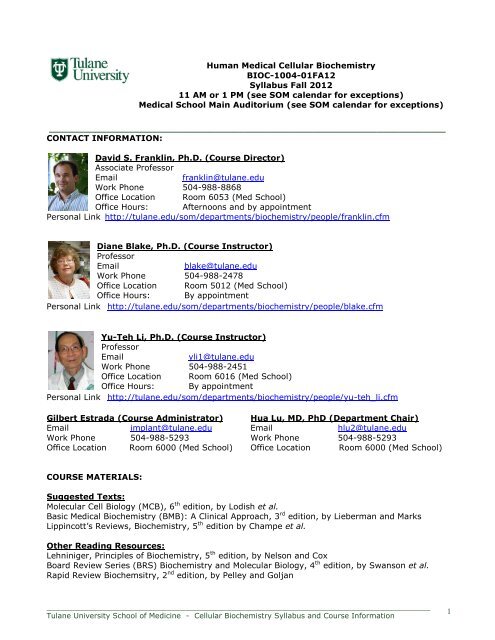
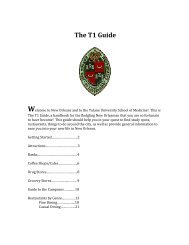
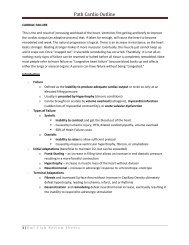
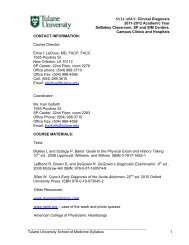
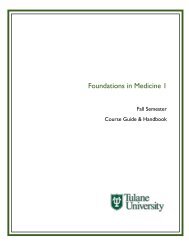
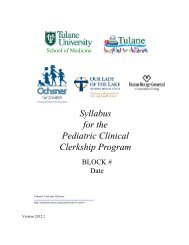
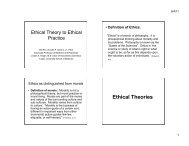
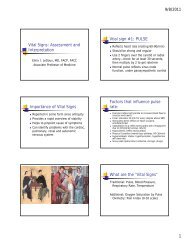
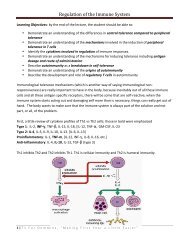
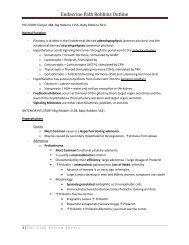
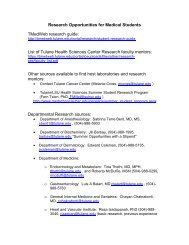
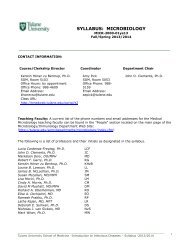
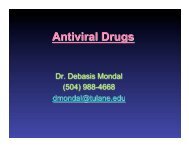
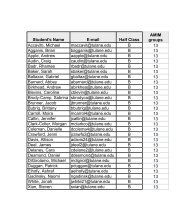
![Research Opportunities for Medical Students 10-13[1] - TMedWeb](https://img.yumpu.com/35158682/1/190x245/research-opportunities-for-medical-students-10-131-tmedweb.jpg?quality=85)